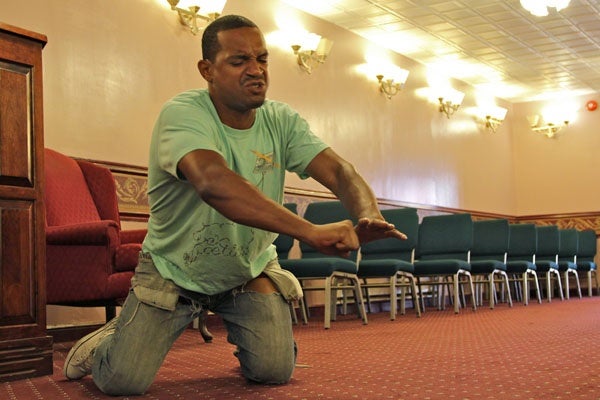Living it up at funeral home: Play celebrates Philly lives cut short
“A roll of the die that changes everything, for everyone, for ever after. This is my moment.” The line recurs through the seven vignettes that make up “The Greatest Life that Never Was,” a play that will be performed in a Point Breeze funeral home.
“If you got a do-over, do you know which moment you’d choose?”
An actor, teetering on a tragic mistake, calls out from the stage, “A roll of the die that changes everything, for everyone, for ever after. This is my moment.”
The line recurs through the seven vignettes that make up “The Greatest Life that Never Was,” a play that will be performed in a funeral home. They are all about death — by crime, by accident, or by negligence.
“Make the wrong decision — you don’t get out of the car, you get into the car, whatever — your life is changed,” said playwright Ed Shockley.
Shockley culled stories out of extensive interviews he conducted with residents of Grays Ferry and Point Breeze. Taking cues from W.E.B. DuBois’ edict that African-American theater should be “by us, about us, and near us,” Shockley’s theater company, Mosaic, is staging the play in the Mitchum-Wilson Funeral Home on 20th Street in Point Breeze.
The play is the theatrical portion of Commotion, a two-week festival focused on Grays Ferry and Point Breeze.
The levels of morbidity lay thickly on the proceedings, as acts about South Philadelphia death are played out in a South Philadelphia room where people mourn the dead. The plays are like tiny, very dramatic funerals, benefiting the living by remembering the dead.
“When you have a funeral, people come who haven’t talked to each other for years, coming together, maybe getting back in touch,” said director Larry Moten. “Why not do that in a space where people normally come? It’s a greeting space. It’s an opening space, as opposed to a closing space at the end of life.”
There are no theaters in Grays Ferry and Point Breeze; the largest rooms available are funeral parlors. “Greatest Life” will be staged in Mitchum-Wilson’s largest hall, an awkward split-level, L-shaped room that can seat 400 people.
Culturally, the play is standing on the history of the black funeral home. Shockley said longtime residents of the neighborhood remember when, in the 1950s and 60s, jazz musicians would come after hours, push the seats and caskets aside, and play.
“The whole be-bop movement in South Philadelphia was either at the [American Legion] — those places for survivors of foreign wars — and the other was at funeral homes,” said Shockley. “They put sawdust down for some reason — maybe there was blood on the floor — and would just come in and party like crazy.”
After the Commotion festival Shockley would like to take “The Greatest Life That Never Was” on tour, to funeral parlors in neighborhoods all over the city.
WHYY is your source for fact-based, in-depth journalism and information. As a nonprofit organization, we rely on financial support from readers like you. Please give today.











